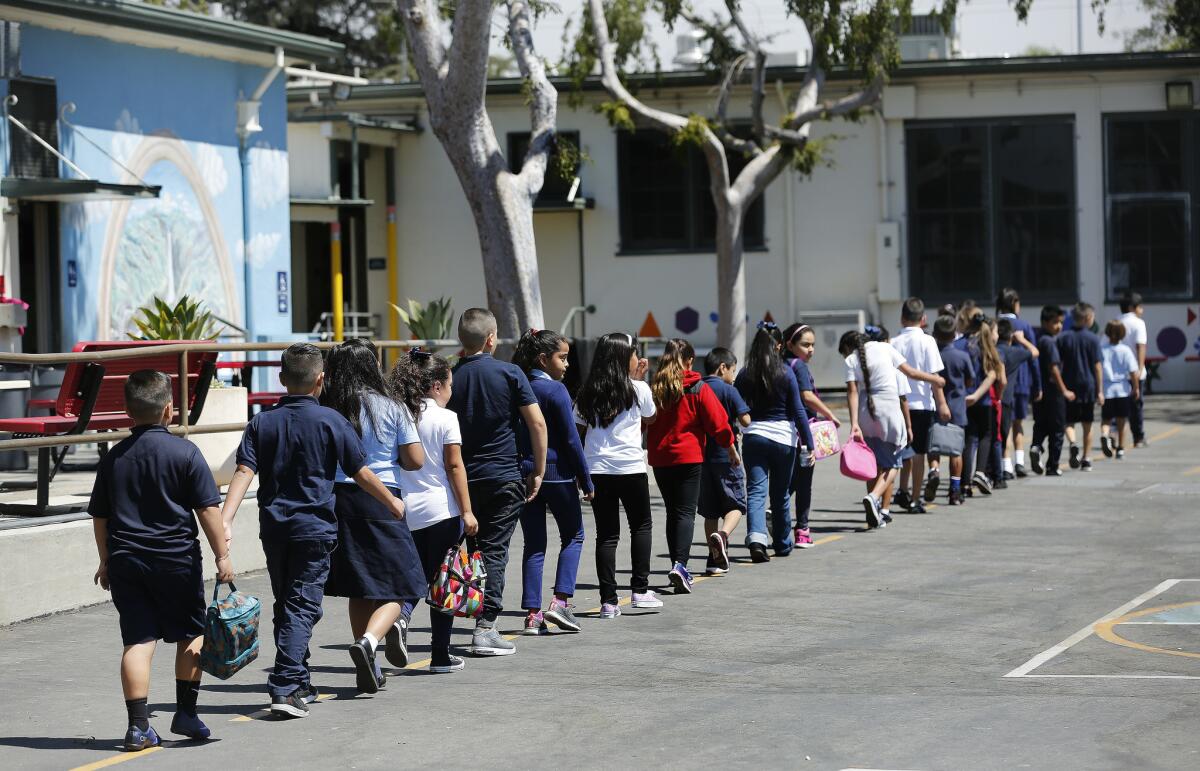The drought is over at L.A. schools. For chocolate milk, anyway

After a five-year drought, chocolate and strawberry milk are making their way back into public school lunchrooms in Los Angeles.
With a vote of 6 to 1, the Los Angeles Unified School District Tuesday loosened a district-wide ban on sugary, flavored milk that took effect in 2011. The board approved a pilot program to study the effects of reintroducing flavored milk in a small group of schools, all of which must volunteer to take part in the experiment.
It is not that board members believe children aren’t consuming enough sugar. Rather, the decision to re-examine milk offerings stemmed from concern that the district is throwing out an obscene amount of food — 600 tons of organic waste each day, according to a 2015 district study.
Much of what’s being taken to the landfill is the plain milk that schools are encouraged by federal law to offer, but that students aren’t enthusiastically drinking.
“Right now we are ... taking garbage bags filled with milk to landfills, and that just doesn’t make any sense to me,” said board member Monica Ratliff, who introduced the idea of the flavored milk experiment. “We can’t continue to ignore this issue.”
What Ratliff proposed, and the board endorsed, is a four-part study in 21 schools that would treat school cafeterias as behavioral science laboratories. Will L.A. Unified school children drink more plain milk if they are also offered the sugary variety, as one study suggests? How might they respond if plain milk is offered to them in an appealing display case, or if they are shown an information campaign about how milk is good for them?
Her proposal references a 2014 Cornell University study, which found that when Oregon elementary schools banned flavored milk, students’ caloric and sugar intake dropped, but they also rejected plain milk in increasing numbers. The health benefits of that milk went down the drain, as students threw their half-empty cartons into the trash.
Parents and health advocates had lobbied successfully for the flavored milk ban, arguing that the drinks had unnecessary added sugar and contributed to childhood obesity. When the board approved a five-year, $100-million dairy contract, there wasn’t a drop of chocolate milk allowed.
I can’t think of anywhere else we would do this. We wouldn’t serve caramel apples to increase apple consumption.
— Brent Walmsley, founder of SugarWatch
Brent Walmsley, founder of the advocacy group SugarWatch, said the board made the right call in 2011 and shouldn’t retreat from its position in the name of reducing food waste.
“I can’t think of anywhere else we would do this. We wouldn’t serve caramel apples to increase apple consumption. We wouldn’t glaze carrots with sugar to get increased carrot consumption,” Walmsley said. “Milk is getting this odd pass here.”
But among school board members, tastes, and minds, have changed.
“At every school I go to, the request is for flavored milk. There’s not one school that I’ve gone to where they say they don’t want flavored milk,” said board member Scott Schmerelson.
The lone no vote came from board member Monica Garcia, who said she would rather leave it to L.A. Unified staff to propose food waste solutions.
Board members were unanimous on one point — their desire to change the U.S. Department of Agriculture’s school meal regulations, which require schools to offer milk with meals in order to receive reimbursement. But their decision Tuesday may have a more immediate effect on flavored milk than on the federal government. The school district’s milk supplier has said it’s willing to lower the amount of added sugar in order to find an equilibrium palatable to both students and parents.
Student board member Karen Calderon said that when she met with a focus group of 14 L.A. Unified students, 13 of them endorsed the idea of dismantling the district’s flavored milk ban.
“This is something I’ve been passionate about for years now, so thank you,” Calderon said.
Twitter: @annamphillips
To read the article in Spanish, click here
MORE EDUCATION NEWS
Huntington Park leaders voted to ban new charter schools for a year
L.A. Unified decides fate of six charter schools; El Camino leader resigns
More to Read
Sign up for Essential California
The most important California stories and recommendations in your inbox every morning.
You may occasionally receive promotional content from the Los Angeles Times.










